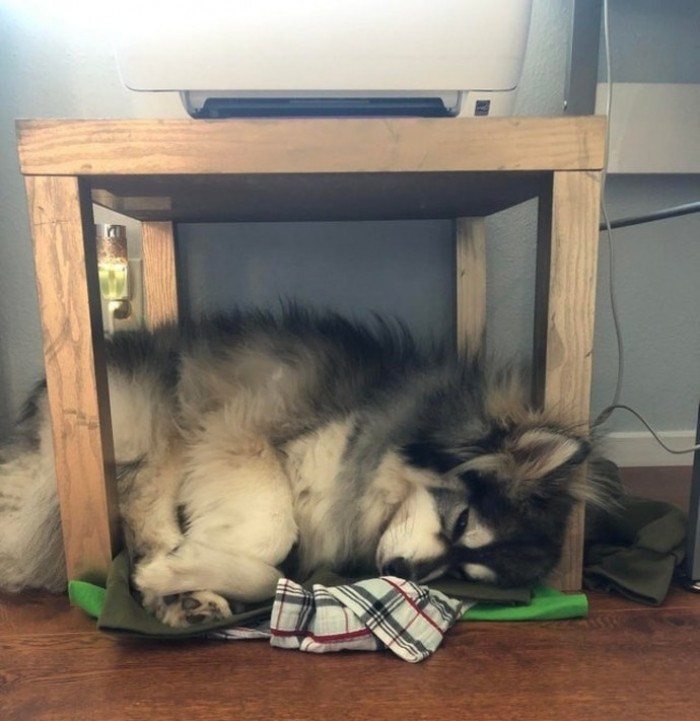18 Random But Hilarious Facts People Have Shared About Their Pets Online
Pets are family, and like any other members of the family, they develop their own personalities over time.
Some people may think that it is not possible to find a pet that fits their personality, but in reality, every single pet has its own unique personality that truly matches—or is the perfect opposite of—someone out there who's still looking for a fur baby to welcome into their family. Once they do find the perfect pet to bond with, knowing the personalities of these adorable creatures is certainly an interesting phase that every owner should have the opportunity to experience.
A dog’s personality is usually determined by its breed. For example, a Labrador Retriever is generally friendlier than a Border Collie. Certain breeds are also more prone to specific behaviors than others; for example, German Shepherds are more likely to be aggressive than Labradors.
But one way or another, you will soon come to know that these affectionate and loving pets actually have so much crackhead energy, and everything they do comes off as either adorable or hilarious. It's true that having a pet is just like raising a baby—because it's definitely amusing to see them do or react to things for the first time!
That being said, people are certainly having the time of their lives sharing and reading about other people's posts regarding their pets' quirky personality traits online. Here are some of the best ones found on Reddit:
1. "My pup got so nervous at the vet that her paws began pouring sweat."

2. "My dog was psyched when his girlfriend from across the street came over for Valentine’s Day."

3. "My pup insists on squeezing into small spaces, so we had to make him a DIY bed under the printer."

The Bond Between Pets and Humans
The relationship between pets and their owners is a fascinating area of study within psychology, particularly in terms of attachment theory. Research conducted by Dr. John Paul Scott and Dr. John L. Demos demonstrated that pets can provide a unique form of companionship that mimics the attachment styles we form with human caregivers. They found that the emotional bonds we create with our pets can significantly enhance our psychological well-being, reducing feelings of loneliness and depression.
Moreover, studies published in the Journal of Personality and Social Psychology highlight that pet owners often report higher levels of happiness and lower levels of anxiety compared to non-pet owners. This emotional connection can be particularly beneficial during stressful times, acting as a buffer against the negative effects of stress by providing unconditional love and support.
Pets and Emotional Regulation
The presence of pets can also support emotional regulation, a critical skill in managing stress and emotional responses. Research by animal behaviorists indicates that interacting with pets can activate the parasympathetic nervous system, which promotes relaxation and reduces anxiety. This response can be particularly valuable during moments of heightened stress or emotional overwhelm.
For individuals experiencing emotional difficulties, establishing a routine that includes pet interaction can be an effective self-care strategy. Engaging in mindful pet activities, such as grooming or simply sitting with a pet, can offer immediate stress relief and promote emotional stability.
4. "My pup likes to sit in a very unique way."

5. "Moose got a ride to the restaurant. He wanted a steak."

6. "My cat’s best friend moved away, but they stay in touch through weekly FaceTime sessions."

An interesting psychological phenomenon seen in pet ownership is the concept of anthropomorphism, where people attribute human traits and emotions to animals. According to Dr. Tal Ben-Shahar, a renowned happiness researcher, "Anthropomorphism can enhance the bond between pets and their owners, fostering deeper emotional connections." By viewing pets as capable of understanding emotions similar to humans, owners may feel more empathetic, leading to healthier interactions.
However, it's essential to maintain a balance; excessive anthropomorphism can lead to unrealistic expectations of pet behavior and misinterpretations of their needs. Dr. Michele Gelfand, a cultural psychologist, notes that "Awareness of this tendency allows pet owners to appreciate their pets for what they are while enhancing their relationship through realistic expectations and understanding."
7. "My friend’s cat likes to stretch."

8. "My pup cries if I don’t tuck him in before I go to work."

9. "My cat is crazy about blanket forts."

Pets and Social Connections
Research has shown that pets can significantly enhance social connections for their owners. A study published in the Journal of Social Psychology found that pet ownership often serves as a social catalyst, leading to increased interactions with others. For instance, dog owners frequently engage with fellow pet owners in public spaces, which can foster new friendships and strengthen social networks.
Moreover, the presence of a pet can ease social anxiety. A clinical psychologist noted that individuals who struggle with social interactions often find that having a pet with them can provide comfort and act as a social lubricant, making it easier to engage with others. Therefore, for those looking to enhance their social lives, considering a pet could be a beneficial step.
10. "Ever since we got a bigger tub, our cat’s been worried about our safety."

11. "My cat secretly coats all my pant legs with fur."

12. "All my cats are hunting the same moth."

Interestingly, pets can also serve as a form of emotional support during challenging life transitions. According to the American Psychological Association, research has shown that pets can provide comfort and help manage symptoms of anxiety and depression during times of stress, such as after a breakup or during major life changes. Their presence can reduce cortisol levels (the stress hormone) and promote the release of oxytocin, which enhances feelings of happiness and bonding.
For individuals navigating difficult emotional landscapes, incorporating structured time with a pet—whether through play, walks, or quiet companionship—can be a practical approach to improving mental well-being. Establishing a routine with a pet can also promote a sense of responsibility and purpose, further enhancing emotional resilience.
13. "My cat constantly looks like she just remembered something upsetting."

14. "My pup loves the bathtub, and my cat loves my pup."

15. "When you sit next to her, my pup insists on holding your hand."

Understanding Pet Personalities
Just like humans, pets have distinct personalities that can influence how they interact with their owners and their environment. A study by researchers at the University of California, Berkeley, identified five major personality traits in dogs: openness, conscientiousness, extraversion, agreeableness, and neuroticism. Understanding these traits can help owners better match their lifestyle with a pet’s personality, leading to a more harmonious relationship.
This understanding also extends to training and behavior management. For example, a more neurotic pet may require patience and gentler training techniques, whereas an extraverted pet may thrive in social situations. Tailoring interactions and training approaches based on a pet's personality can enhance the bond between owner and pet, leading to better behavior and a deeper emotional connection.
16. "Whenever I’m sad, my cat tries to make me laugh."

17. "My parents’ pup is determined to use the ottoman, even though he outgrew it."

18. "My Japanese cat loves to sit near my rice cooker and smell the steam of freshly cooked rice."

In addition to the emotional benefits, pets can also play a critical role in promoting physical health. A study published in the journal Circulation found that pet ownership is associated with lower blood pressure and cholesterol levels. Regular walks or playtime with pets encourage physical activity, leading to improved cardiovascular health.
For those looking to reap these health benefits, setting daily routines that incorporate walks or interactive playtime with pets can be a practical strategy. Such activities not only enhance physical health but also strengthen the emotional bond between pets and their owners.
There is no denying that pets are an important part of our lives, but it is equally important that we take care of them properly. We should always make sure to provide them with the care they need so that they can live a long, happy life with us—and provide us with unmatched entertainment that only they can give!
Does your pet have any quirks? Comment with your thoughts, or share this article for all your family and friends to see!
Psychological Insights & Implications
In summary, the psychological benefits of pet ownership are backed by substantial research across various fields, from attachment theory to social psychology. Pets not only provide companionship but also serve as vital sources of emotional support and social connection. As Dr. Alan Beck from Purdue University’s Animal Behavior Clinic notes, the reciprocal relationship between pets and humans promotes mutual well-being, enhancing the quality of life for both parties. Embracing a pet's unique personality and incorporating structured interactions can lead to improved mental and physical health outcomes, making the journey of pet ownership a profoundly rewarding experience.



